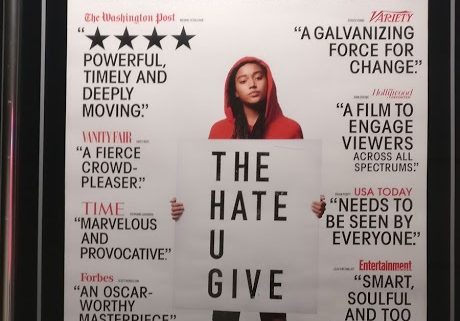“The Hate U Give” is based on Angie Thomas’s best-selling YA novel of the same name. This post deals with the movie, but you can read my review of the book here.
The protagonist of “The Hate U Give” is Starr Carter (Amandla Stenberg of “Everything Everything”) a high school student who has quite a few areas of her life that warrant careful navigation. The first two scenes show two starkly different realities that profoundly affect Starr. Each day her mom drives Starr, her older brother Seven and younger brother Sekani to an elite private school which is a considerable distance from her family’s home in Garden Heights. Whether at school or out and about in her neighborhood, Starr finds herself frequently code switching. While she is adept at varying her speech and carriage based on her surroundings, she never feels completely comfortable anywhere–which leads her to question her identity. At school, Starr and her brothers are among the few students of color and she there endures regular microagressions. At home in Garden Heights, her father Maverick had “The Talk” with his children–a lecture about conduct during interactions with police–at painfully early ages. The gun violence, gang activity and open-air drug dealing in Garden Heights draw heavy policing and residents know police encounters are a “when” not an “if.”
And while a key conflict in the movie is the aftermath of Starr having witnessed the killing of her friend Khalil by a police officer during a traffic stop, there is conflict aplenty in this movie. In addition to standard-issue teen angst, Starr’s life is a delicate quilt of complexity. A community activist (played by Issa Rae) wants her to go public with the story of Khalil’s death. Starr’s parents Lisa and Maverick (Regina Hall and Russell Hornsby) are madly in love, but can’t agree on whether or not to leave Garden Heights for the suburbs. Starr’s is a blended family, and complicated. Maverick spent time in prison, which makes for uncomfortable dealings with both Starr’s Uncle Carlos, who is a police officer (Common) and with King, a former friend of Maverick’s and local drug dealer (Anthony Mackie). Further confounding things are the stares Starr and her boyfriend Chris get when they are together because they are an interracial couple. Director George Tillman Jr. does an excellent job of not relenting as he shows the viewer the cumulative effects of trauma and large and small stressors on Starr by layering and compressing the tension and pressures Starr experiences until they will either explode or suffocate her. Will she become a statistic or a victim or a voice?
The film is not an exact copy of the book, and I found it to be full of suspense and a few surprises. Oh, and it was perfectly cast! As Starr, I marvel at how quickly Amandla Stenberg has seemed to grow up since her role as Rue in “The Hunger Games.” I appreciate her efforts on social media around both racial disparity and Black Girl Magic. As a theatergoer I enjoy being able to watch her disappear into the roles she’s had so far. Regina Hall has brought the role of Lisa Carter to life as an intelligent, loving, tough and beautiful mother. And let’s not forget Russell Hornsby! Since his work on “Lincoln Heights” (along with that of the rest of the cast) was recklessly unsung, many may know him from “Grimm” or “Fences.” As Starr’s father Maverick, Hornsby offers a portrayal of an African-American father with even more depth than in the written version. Some of my favorite scenes are those that show how affectionate and tightly-knit the Carter Family is.
Should “The Hate U Give” be seen on the big screen, streamed, or skipped by all means? See this movie! Be warned, there is violence. And that is precisely what makes this such a timely film that I feel can spark needed discussions about the value of the lives of black and brown people and not just the deaths of African-Americans at the hands of law enforcement.

